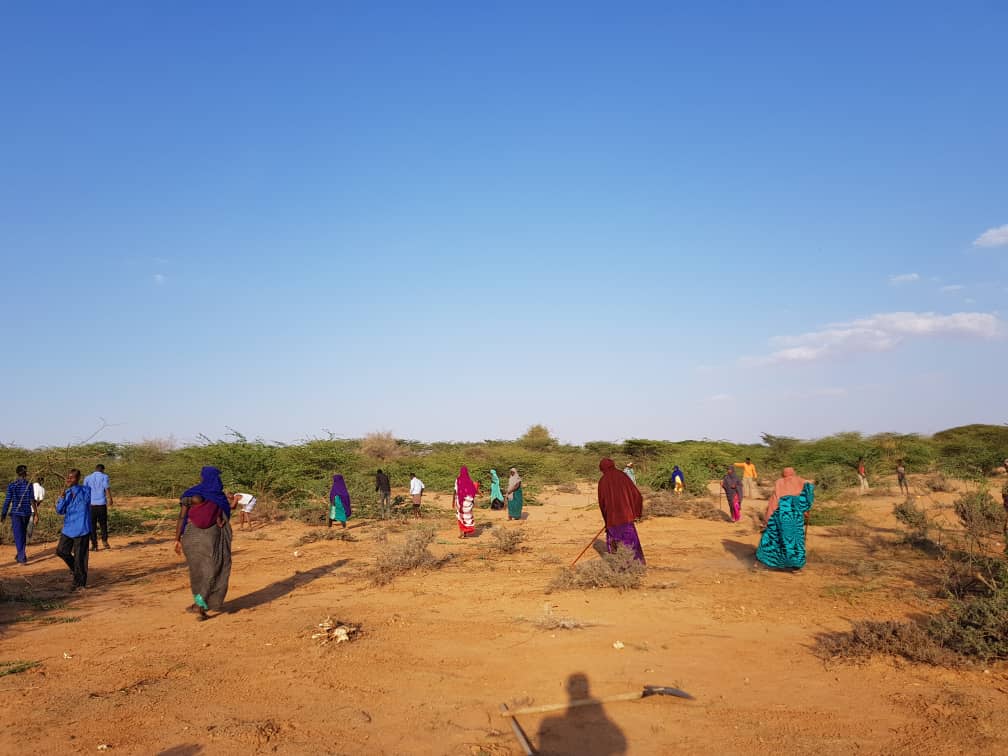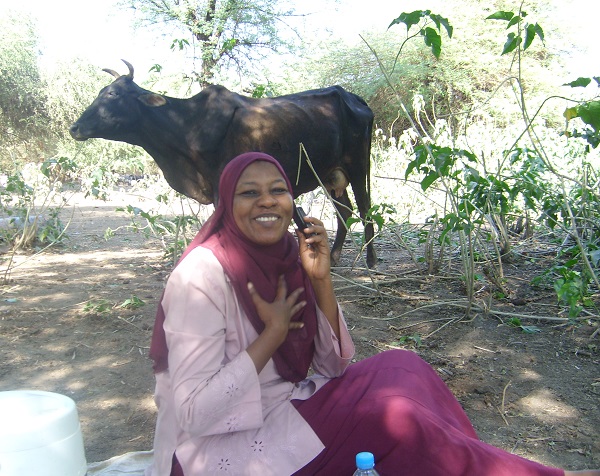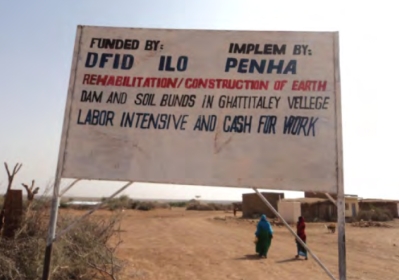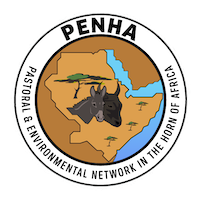PENHA in Somalia/ Somaliland
However, there are many problems and challenges pastoralists in Somalia/Somaliland are facing. Lack of political stability, drought, and the export ban of livestock to the Gulf countries are putting major constraints on pastoralist economies and livelihoods.
Country profile
Population
15 million
Agro-pastoralist population
55%
Surface area
637,660 km2
Land occupied by pastoralists
60-70%
Our work in Somalia

Tackling Somaliland pastoralists poverty and environmental degradation
Baring Foundation funded a capacity building programme in three regions of Somaliland (Sool, Erigavo and Sanaag).
Read moreBaring Foundations has funded capacity building programme in three regions of Somaliland (Sool, Erigavo and Sanaag) during the period of 2001 to 2004.
The basic aims of the project were:
1) Establish local pastoralist non-governmental organisations (NGOs) and Community Based Organisations (CBOs) in Somaliland;
2) Build up the capacities of these organisations at the grassroots level so that pastoralists can have the possibility of controlling their own development;
3) Promote debate within the country about the role of the pastoralist economy – with the purpose of encouraging policymakers, development agencies and others to recognise the importance of pastoralists as stakeholders in both the national and the local economies.
In the evaluation report at the end of the project, the researcher said:
“(t)here is a general feeling that PENHA is meeting the needs of the Pastoralist communities, and this mutual trust and acknowledgement is an important and necessary precursor for the development of collaborative and sustainable programmes.”
The end of project report can be downloaded here as a PDF.

Economic empowerment of women
This project aims to empower women in pastoralist communities who are disadvantaged and living under difficult socio-economic conditions in arid and semi-arid areas.
It is equipping women with business and production skills, and by promoting their access to rural finance providers (where these exist) as well as to their access to markets, it will help the beneficiaries to undertake new economic activities or expand existing ones and thereby increase their incomes. It is taking place in Uganda and Sudan in addition to Somaliland.
The picture shows a woman using her mobile phone in the rural area.
It is equipping women with business and production skills, and by promoting their access to rural finance providers (where these exist) as well as to their access to markets, it will help the beneficiaries to undertake new economic activities or expand existing ones and thereby increase their incomes. It is taking place in Uganda and Sudan in addition to Somaliland.
The picture shows a woman using her mobile phone in the rural area.
Objectives
1) To equip women with the skills and knowledge needed to undertake new enterprises
2) To increase women’s access to finance and markets
3) To advocate for positive micro-finance policies vis-a-vis women in pastoral areas as well as equitable access to credit
Activities
This project started in 2009 and was completed in 2011. The programme included the following activities:
1) Identifying project implementation sites and women groups
2) Conducting action-oriented research: Mapping and obtaining data and information
3)Completing a needs assessment
4) Training of women in their groups
A photo essay of activities at the end of 2009 can be downloaded here.

Sustainable employment and economic development
While pastoralism remains the backbone of Somaliland’s economy, accounting for a large share of both employment and exports, pastoral livelihoods are coming under increasing strain.
Factors include population growth (outstripping sluggish economic growth), recurrent and severe droughts, and the loss of vital grazing land. Youth unemployment is a particular problem. Political instability in the region and other factors deter investment and constrain economic growth. For pastoralist communities, economic diversification is one way of reducing vulnerability to drought. In this context, there are a number of things that external actors can do to support and kick-start local efforts.
Read moreFactors include population growth (outstripping sluggish economic growth), recurrent and severe droughts, and the loss of vital grazing land. Youth unemployment is a particular problem. Political instability in the region and other factors deter investment and constrain economic growth. For pastoralist communities, economic diversification is one way of reducing vulnerability to drought. In this context, there are a number of things that external actors can do to support and kick-start local efforts.
The Sustainable Employment & Economic Development (SEED) Programme is funded by Britain’s Department for International Development through the International Labour Organisation (ILO).
PENHA-Somaliland worked with ILO-Nairobi to design a program of activities aimed at promoting employment and enterprise.
The project involves:
1) environmental rehabilitation work employing community members (cash for work)
2) value chain analysis and workshops bringing together market actors
3) a detailed market study, conducted in collaboration with Practical Action (Nairobi), covering the honey and fodder markets.
4) the provision of training, tools and hives for fodder production and beekeeping.
Substantial numbers of women have been employed to do the very physical environmental rehabilitation work, on the assumption that women spend a greater proportion of earned incomes on household welfare than do men. The environmental work also supports commercial crop cultivation, livestock keeping (through fodder production) as well as a water supply for people and animals, with very significant benefits for women in particular. The project also involves support for cooperatives, which local businesspeople have already formed, as well as efforts to enhance the effectiveness of marketing arrangements.
PENHA is working in collaboration with Practical Action (Nairobi), the Academy for Peace and Development (APD) and the Hargeisa and Nairobi offices of the FAO and ILO. APD, a local research institution with a strong track record in conflict analysis, is collaborating with PENHA on analytical outputs, conflict analysis and training, as well as monitoring and evaluation.
The targeted beneficiaries are:
1) Around 5,000 people in selected rural communities in the Togdheer and Sanaag regions
2) Unemployed youth as well as women and marginalized people
3) A range of market actors, including Producers, Artisans, and Cooperatives; Processors and Traders; Research Institutions and Business Development Service Providers; (Potential) Investors; Local and Central Administrations at the appropriate levels.
The project is working with people who are currently engaged in or have the potential to take up, beekeeping/honey production and fodder production. The target communities are predominantly made up of agro-pastoralists and pastoralists (extensive livestock keepers).
In the first phase of this project, the honey and fodder markets were identified as suitable targets for intervention. With Practical Action, a market study was conducted in order to plan a set of interventions based on the Participatory Market System Development approach. This PMSD approach looks at the different market actors in a particular value chain in the context of the economy as a whole.
Our market study confirmed that there is significant scope to upgrade honey and fodder production and make markets work better. Production, processing, the flow of information on products, techniques and markets, are all inadequate or ineffective. The assumption here is that there are particular market failures that can be addressed by suitable interventions, such as enhancing access to information.
Products are generally of poor quality and there is substantial scope to improve products and marketing, and thereby, potentially, increase local incomes and employment. Linking upmarket actors, the different players in the honey and fodder value chains can engender significant improvements. This project aims to mobilize market actors, assess value chains to understand the mechanics of the market and its dynamics and identify gaps for interventions and try to bring together market actors in a participatory manner.
Specific environmental rehabilitation projects were identified. The rehabilitation of an old British-built canal that diverts water from a seasonal wadi (river) onto cropland has brought new land into productive use and significantly increased local incomes. The rehabilitation of a valley dam has given two pastoral communities a reliable water supply (for most of the year). Soil bunds across the range and farming land have resulted in new crops and diminished soil erosion. All of this work has been carried out by local people earning wages, under PENHA’s supervision.
The progress of the project can be seen from the two following photo diaries in PDF form.
Download the first diary here.
Download the second diary here.
